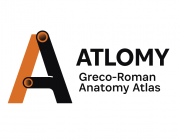
Lidia Ozarowska is a PhD in Ancient History and currently a research fellow at the Hebrew University of Jerusalem, where she is part of the ERC project Atlomy. Before coming to Israel, Lidia had taught a variety of subjects in Ancient History, Archaeology and Literature at the University of Oxford and (briefly) at the University of Bristol. Lidia comes from a broadly interdisciplinary background and aims to combine the material, methods and perspectives traditionally divided between humanities and sciences. Her research interests, straddling discipline boundaries, include science in antiquity (its theory, practice and perception), knowledge transmission, religious experience, social determinants and impact of religion, the relationship between religion and science, as well as human perception and its impact on experience and its representation.
Lidia is currently preparing for print a monograph on the relation between the evolution of healing sanctuaries and the development of medical knowledge and practice in antiquity (to be published with the Oxford University Press)
Publications
Articles
2020 “Disbelief and Weak Belief in the Cult of Asclepius”, Electra 5, pp. 61-78 (DOI: 10.26220/ele.3533)
2019 “Greek divine cures overseas – Italian realisations of the Greek paradigm”, in Morais, R., Leão, Pérez, D., Ferreira, D. (eds), Greek Art in Motion. Studies in honour of Sir John Boardman on the occasion of his 90th birthday (Oxford): 417-427 (DOI: 10.2307/j.ctvndv598) – the proceedings volume of the Conference in Honour of Sir John Boardman “There and Back Again: Greek Art in Motion”, held 3-5 May 2017 in Lisbon
2018 “Lost in quotation. The curious case of Kleo’s dedication quoted in the Epidaurian iamata”, Zeitschrift für Papyrologie und Epigraphik 206, pp. 57-67
2011 “Lifetime burning in every moment with the fire of eternal life or Heraclitean thought in T.S. Eliot’s Four Quartets”, The Athens Dialogues. An International Conference on Culture and Civilization (Athens), published also in the E-Journal of the Athens Dialogues:
http://athensdialogues.chs.harvard.edu/cgi-bin/WebObjects/athensdialogues.woa/wa/dist?dis=98
2009 “How, if at all, did he convince that not live at any price should one, but live well – on the motif of Socrates’ death in modern literature”, Szkice Humanistyczne 25 [in Polish]
2009 “Progress of enlightenment or decay of faith? Joseph Conrad face to face with the experience of modernity”, http://www.polon.uw.edu.pl/oddo/article.php?id_article=45 [in the journal ODDO, in Polish].
Co-editing work
2011 “Feast, Play and Celebration in the Ancient World”, SCHOLE Project, Vol. 5 (ed. with K. Sekita & J. Simon), Warszawa – post-conference publication
Academic translation
2022 Węcowski M., Prisoner’s Dilemma. Athenian Ostracism and its Original Purpose (Oxford: Oxford University Press) – first published in Polish, Toruń 2008
2022 Matuszewski R., ‘When a Man Is an Island: Introductory Remarks on Being Alone in Antiquity’, in Matuszewski R. (ed.), Being Alone in Antiquity: Greco-Roman Ideas and Experiences of Misanthropy, Isolation and Solitude (Berlin, Boston: De Gruyter), 1-19
2011 Davidson, J. (2001), “Dover, Foucault and Greek Homosexuality: Penetration and the Truth of Sex”, Past and Present 170: 3-51, in Lengauer, W., Trzcionkowski, L., Antropologia antyku greckiego (Warszawa): 553-585; translation into Polish with translator’s comments


